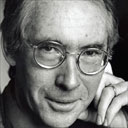
Another novel recently read was William Boyd's
Brazzaville Beach. One of the TBR books
I've pledged to read this year, it's been sitting on my shelves since I bought this copy, second-hand from
Skoob a couple of years ago. The novel won the James Tait Black Memorial Prize for 1991.
It's the first William Boyd I've read, I'm ashamed to say, and I wonder just why it took me so long because it's such an intelligent, well-written novel that now I want to plunge into the others.
Hope Clearwater lives alone in a small beach house of Brazzaville Beach in an unnamed African country. (There actually
is a Brazzaville Beach in the republic of Congo though!). She looks back on the cataclysmic events which have changed the course of her life, and throughout the book two stories run parallel, at times echoing each other.
She recalls her relationship and marriage to a brilliant but psychologically unstable mathematician genius. At the same time describes how she came to Africa to participate in a primate research project at The Grosso Arvore Research Center (there are
echoes of Jane Goodall's work here) and finds herself uncovering an unnerving truth about the nature of chimpanzees (and by extension perhaps, about mankind's predisposition towards violence). Her discoveries have far reaching consequences and she finds herself pitched against her employer and mentor who refuses to accept her findings.
Boyd is particularly good here at pointing out the dangers of narrowly focused dogmatic belief and academic obsession. I enjoyed the way Hope refers to the mathematical principles she's learned from her husband, John, and tries to draw a philosophy from them to illuminate the seeming chaos of her own life.
The characters, human and ape, were all well-drawn. Here's a male author convincingly able to inhabit a female skin - I felt a lot for Hope. (And I like to imagine for her the happy ending that isn't quite reached in the book.) I also felt deeply for the manic-depressive John Clearwater who fails to fulfill his dream of great Mathematical discovery and suffers terribly because of it.
This book has one of the best first sentences ever:
I never really warmed to Clovis-he was far too stupid to inspire real affection-but he always claimed a corner of my heart, largely, I supposed, because of the way he instinctively and unconsciously cupped his genitals whenever he was alarmed or nervous.
And if that's whetted your appetite, you can also
take a gander at the opening pages on
amazon.com.
Blanche d'Alpuget's 1991
New York Times review is
here, while Robin Mokie in
New Scientist takes a look at how research scientists are portrayed!
Because, while anyone who loves a well-written thought provoking novel will enjoy this book, it will appeal particularly to those of you with a love and understanding of maths and science. (Sham? Machinist? Greenbottle? Burhan?)
 Sebastian Barry has won a second major prize for The Secret Scripture, carrying off the James Tait Black Memorial Prize for Fiction (Britain's oldest literary award) last night.
Sebastian Barry has won a second major prize for The Secret Scripture, carrying off the James Tait Black Memorial Prize for Fiction (Britain's oldest literary award) last night.






